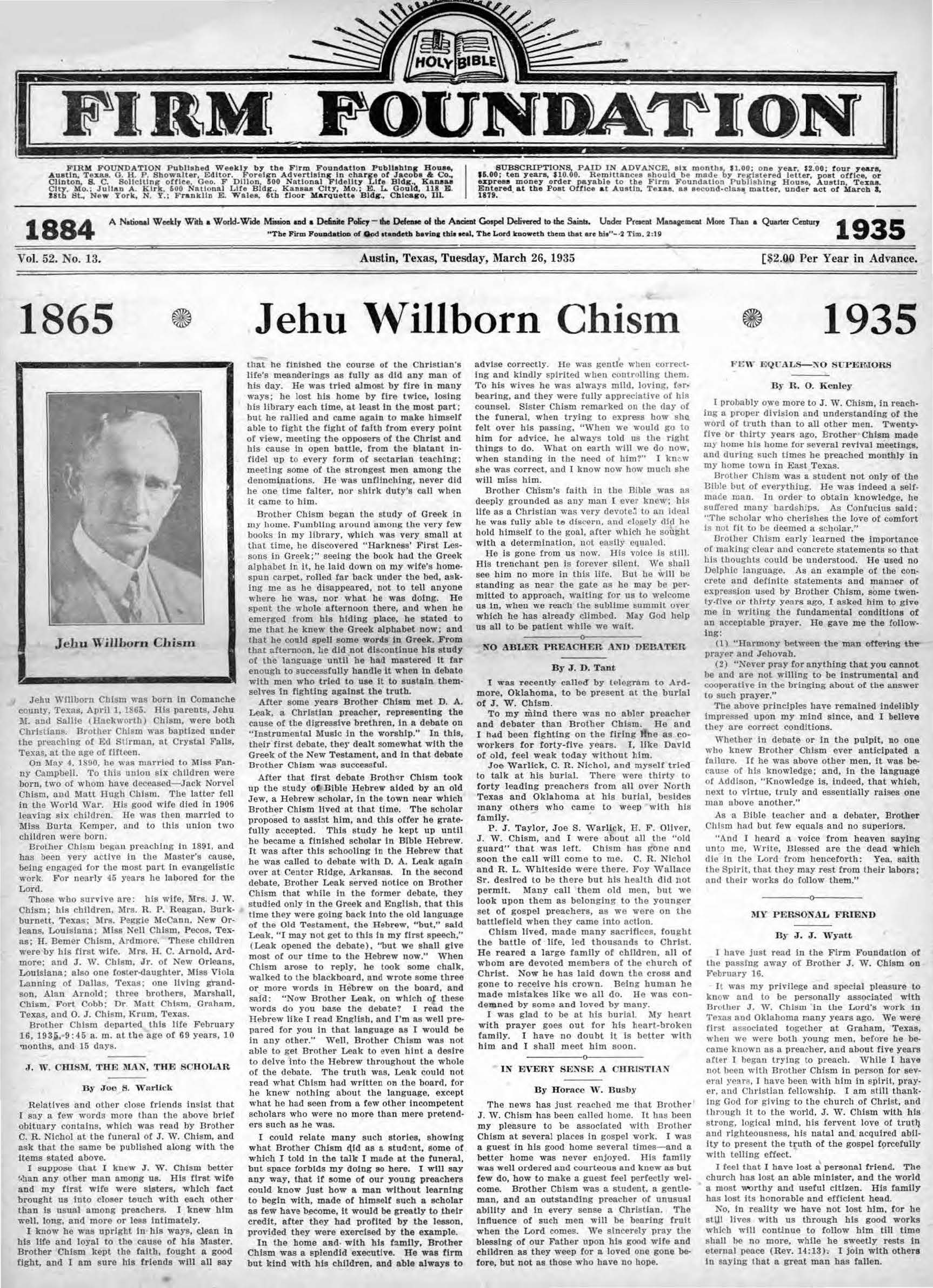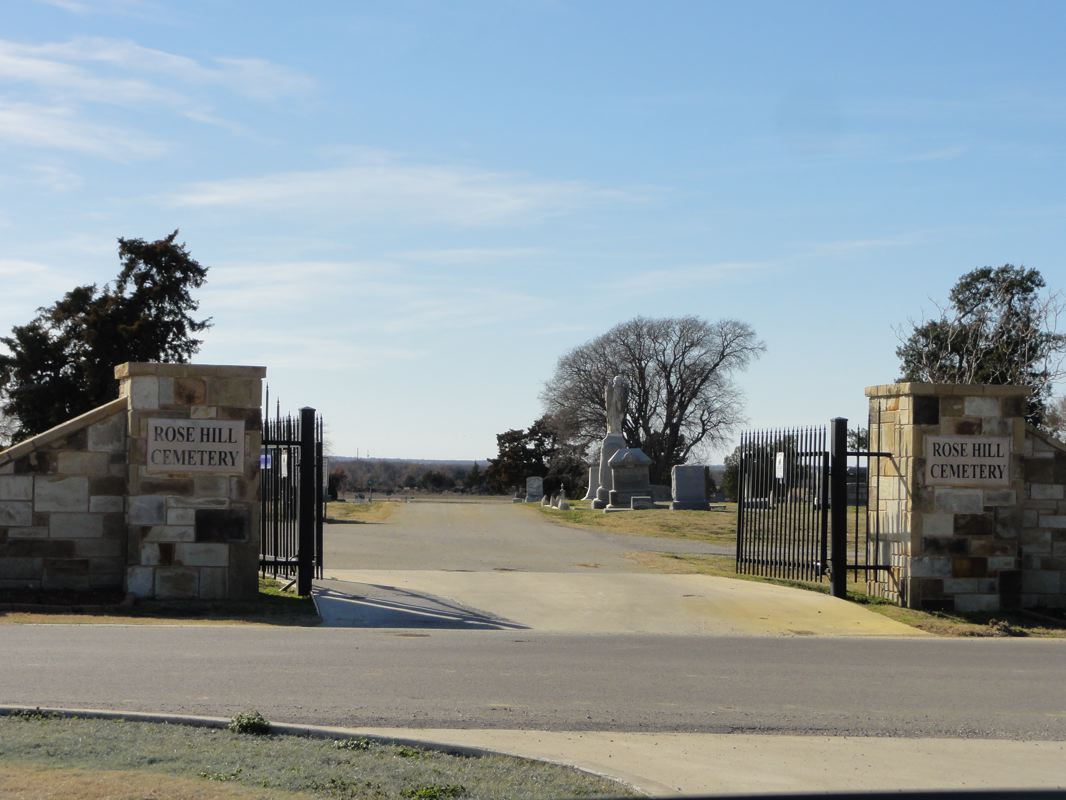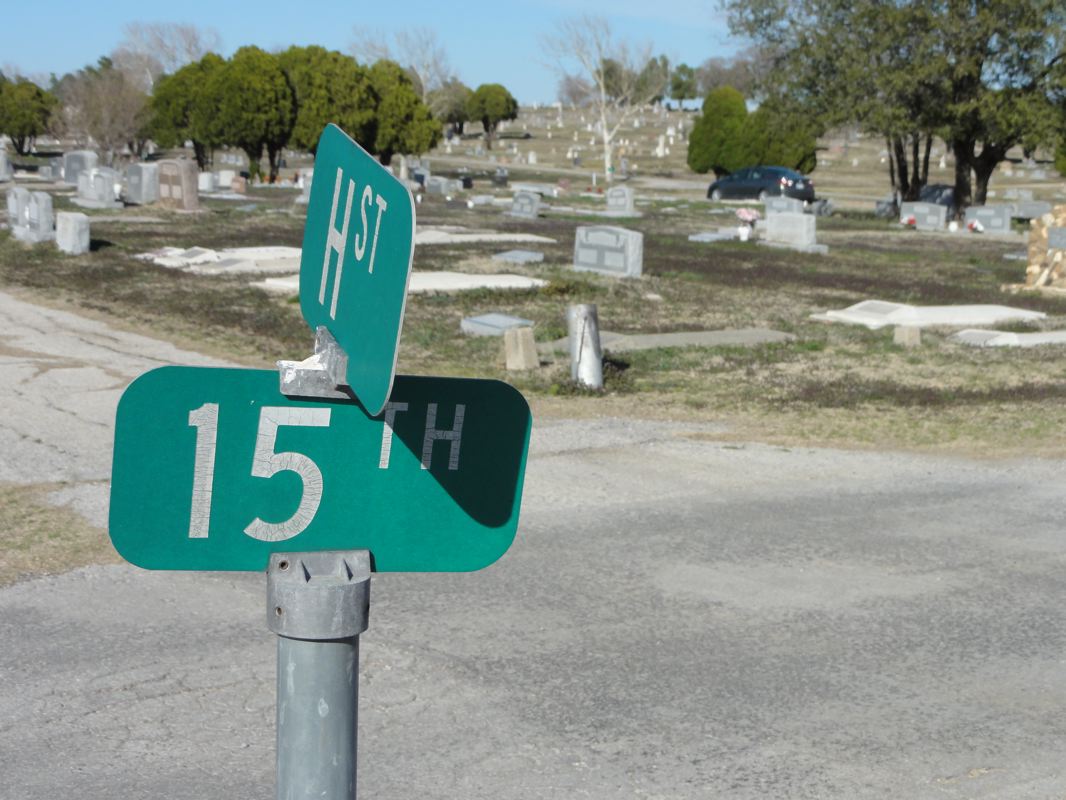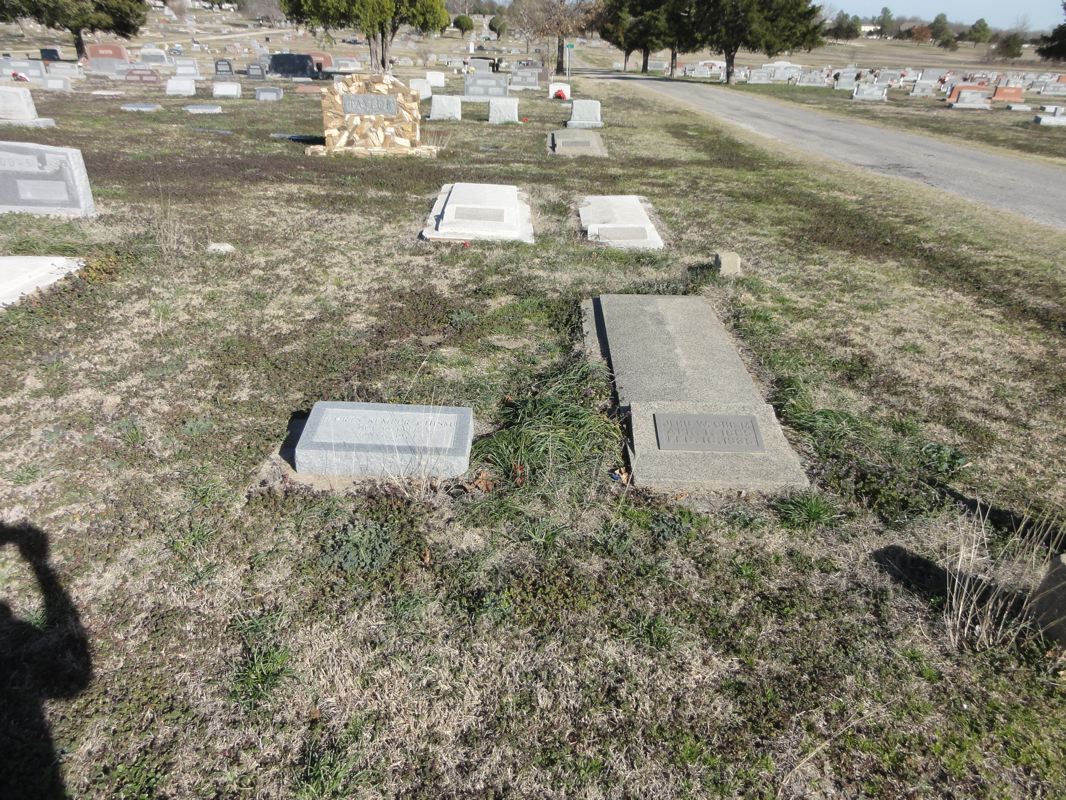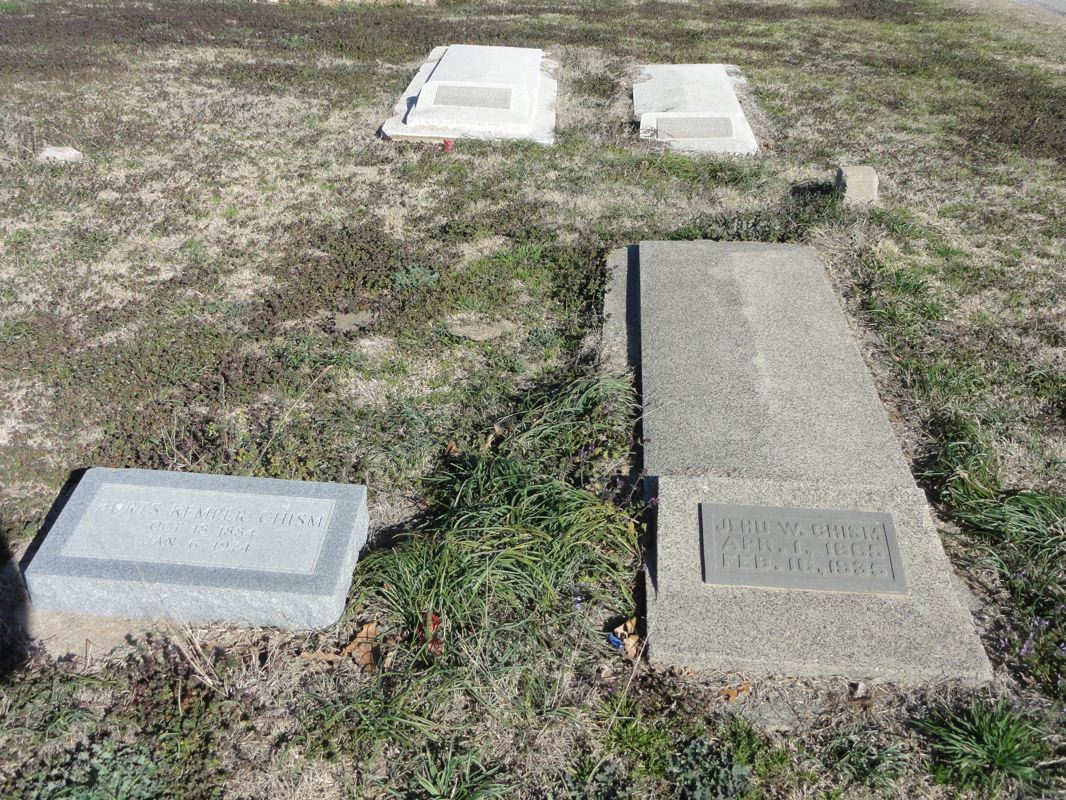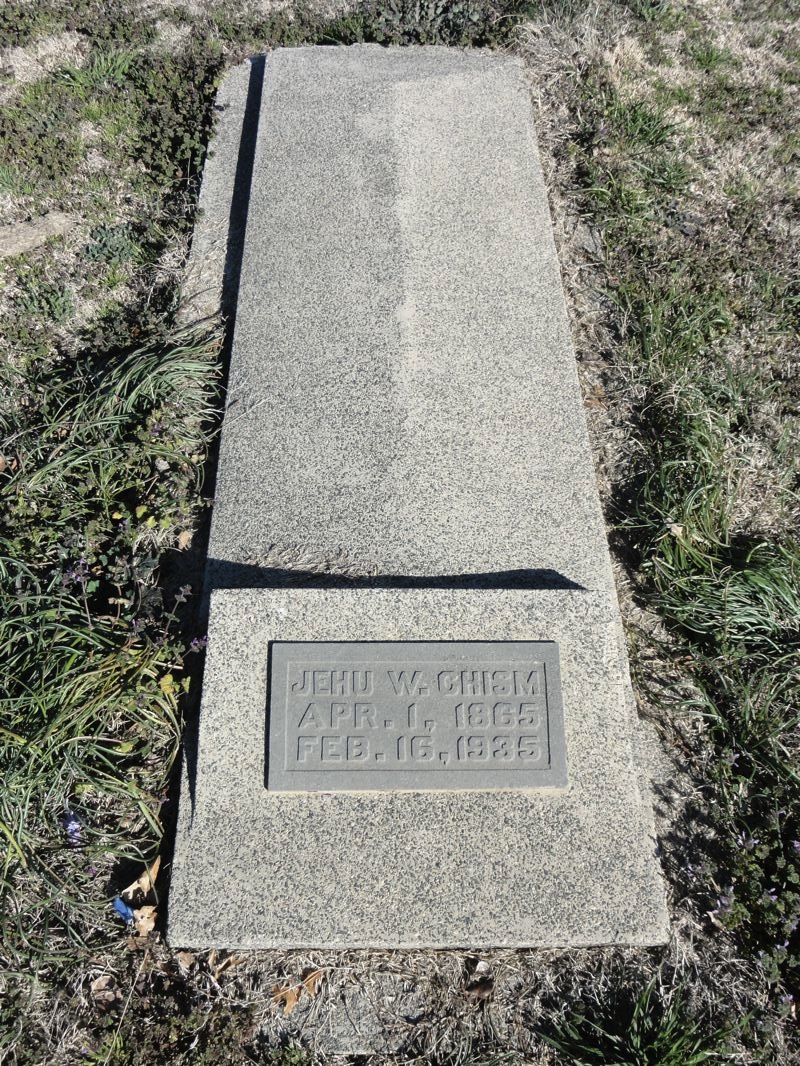Jehu Willborn Chism
1865-1935
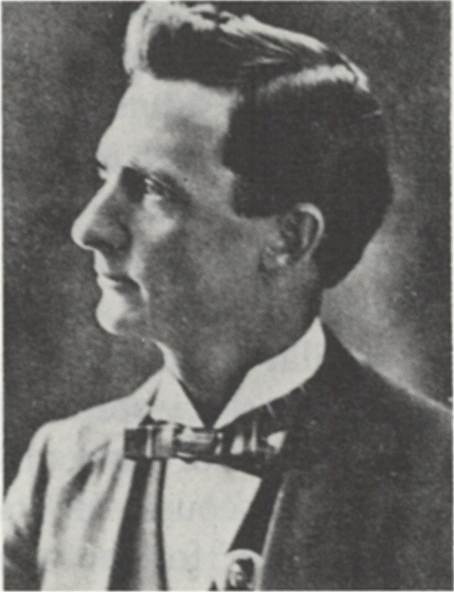
Sketch On The Life Of J.W. Chism
On February 18, 1935 Jehu Willborn Chism departed from this earthly sphere to be with his Lord. He was recognized by many as being one of the "Old Guard" in the early days of this century. Funeral services were conducted on Monday, February 18, 1935 in the meeting house of the Church of Christ in Ardmore, Oklahoma with the local preacher, Forrest R. Waldrop conducting the services with the assistance of C. R. Nichol of Seminole, Oklahoma, Joe S. Warlick of Dallas, Texas, J. D. Tant of San Benito, Texas and Basil D. Shilling of Healdton, Oklahoma. Many of the best known preachers of the church at that time attended the service and were listed as honorary pallbearers from out of town including G. H. P. Showalter, R. L. Whiteside, Foy E. Wallace, Jr., Thomas E. Millholland, John McKinzey, M. R. McGowan, R. A. Musgrave, J. W. Aiken, Lyle Price, Flavil Colley, W. K. Rose, Cled Wallace, W. D. Bills, C. D. Williams, D. T. Carolton, Richard Hall, Raymond Fry, John Pigg, Jack Ewton, W. B. Cox, Gray Carter, Ramsey Wright, Willis Kreager, R. O. Kenley, T. H. Jackson and W. E. Campbell. The active and honorary pallbearers from Ardmore included W. B. Coffman, W.C. Clock, W. M. Porter, W. S. Hammer, Bennett Wallace, Harry Ester, E. E. Henry, L. E. Linder, Leslie Parker, C. D. Champion, Cyrus Harness, Ira Vickers, H. L. Cathey, Ed Patillo, H. L. Riddle, Alvin Bruce, Jim Collins, J. C. Little, Buford Myers, Melvin Mills, Verner Harris, Hale Dunn, Matthew Alexander, Gerald Mobley, Walter Hodges, R. S. Hayden, Nat Haynes, W. M. Bryant, Virgil Cordell, J. L. George, M. M. Wallis, Dr. Von Keller, Arthur Rose, J. D. Parks, Joe Chambers, Rudy Griffits, R. T. Dallas, Arthur Roller, Ravell Morton, Wm. G. Davisson, C. M. Jackson, Collie Thurston, Herman English, Joe Stubblefield, Ott Holden, Dr. R. O. Blagg, David Ogden, William Hamilton and Earl Rader.
Jehu Willborn Chism was seldom known by his full name for most everyone called him "J. W." He was not only well known; he was well loved, and this affection and admiration included many who were not members of the Church of Christ. He had lived in Ardmore, Oklahoma for some years prior to his death.
This biographical sketch was compiled by Flavil R. Yeakley, Sr. from personal remembrance of J. W. Chism, interviews with many who had a close personal acquaintance with him and from numerous other records. Brother C. R. Nichol published a book in 1911 that was reprinted by the Firm Foundation entitled "Gospel Preachers Who Blazed the Trail." Another sketch is found in "The Great Debate" between J. W. Chism and John W. Ring; conducted in August of 1907 and reprinted by the Old Paths Book Club. Also of interest in documentary evidence is the memorial issue of the Firm Foundation dated March 26, 1935 and the Sunday issue of the Daily Ardmorite of February 17, 1935. However there is a priceless record of his life prepared by his own hand just a short time prior to his death; this biographical sketch has been duplicated by thermofax and is to be found in the library of Abilene Christian University.
The parents of J. W. Chism came from Mississippi to Texas when Texas was a wild frontier under the dominion of Mexico. His father's name was Jehu M. Chism. At 27 years of age he married Miss Sally Hackworth, the daughter of Dr. Matt Hackworth, who was not only a medical doctor, but also a gospel preacher of no little reputation. Sally was 17 years old when she married Jehu M. Chism, but the exact date of their marriage is unknown. However it is known that they came to Texas in 1853 and settled in Washington County for 3 years. Then in 1856 they moved to Comanche County, then known as "Mercer's Colony." It was during their stay in "Mercer's Colony" that J. W. was born, so he could be counted as a child of the frontier. J. W. had 4 brothers and 1 sister. We can't seem to find the names of these children nor the dates of their birth, but J.W. Chism was born April 1, 1865, during the family's last year in Comanche County. Then the family moved to north-east Texas near Roxton.
In 1876 his sister, Mrs. B. D. (Dosia) Williams died on Dec. 28th, leaving two children. This was the first death in his father's family, and it came as quite a shock to J. W. and others in the family. This seemed to have triggered his interest in studying the Bible for he read the New Testament through during the following year - and his interest in the Bible increased each year thereafter. When he was 13 he began reading the Revised Standard Version and he did most of his reading and studying in that version.
In 1877 the Chisms moved to Stephens County, locating in a valley of the Clear Fork of the Brazos River in an area known as Miller Valley, where they lived until 1883. It was during their residence here that J. W. heard Brother Ed Stirman preach at Crystal Falls, Texas and was baptized. That year the family moved back to Comanche County and settled on Rush Creek, about 3 miles from where the community of Downing later grew up. In April of 1884 the mother of the family died of pneumonia and was buried in the Rush Creek cemetery. That was a tragic year for the family for an overflow of the creek wiped out their crop. J. W. had a brother who had moved to Young County so he went out to visit and work with him. This brother persuaded J. W. to study photography. He found it interesting and easy to master so in the fall of 1888 he opened a photographic gallery and worked at this profession until 1890.
In April of 1890 he met Miss Fannie L. Campbell, and after a whirlwind courtship of only twenty days they were married on May 4, 1890. Soon after they married they moved to Wichita County where he put in a crop, but the crop failed because of the severe drought. When they ran out of money J. W. felt compelled to take his wife back to her parents' home while he tried to get out and make enough money for them to start over again. It was decided that he would do house to house photographic work while they stayed with her parents. However, something happened shortly after they returned to the home of her parents that proved to be a turning point in his life. J.W.'s father-in-law, an elder of the church in Joshua persuaded him to preach his first sermon - that was the fourth Sunday in April of 1891. He didn't intend to preach; he intended to make his living with photography and preach as the occasion demanded. In 1891 he preached 27 times. They stayed with his wife's people for eight months and it was during this time that their first daughter was born. Shortly after the birth of their first daughter they decided that they had enough money to open a photographic gallery. They picked Pilot Point, Texas as their city. He went ahead of his wife and daughter and opened his photographic gallery, and as soon as he could get things ready he sent for his wife and daughter. He remarked in his biographical sketch, "When she arrived I had half a loaf of bread, one pound of bacon, and ten cents in cash, but the next day I did some work for which I collected $5.00. That encouraged me; but that night fire destroyed all that I owned, and someone stole the $5.00, so I was left among strangers with my wife and child to care for with but ten cents." But somehow or other they made it. J. W. did not get rich as a photographer, but he did make a living, and this business gave him considerable time to study and paint. He became a very fine artist and maintained his interest in art throughout his life, but as far as we can learn he never tried to make a living with his art work.
It was in the beginning of his second year of preaching that he conducted his first debate; in November of that year he debated again, and his third followed in February of the next year. In June of 1892 he preached in his first protracted meeting, during which he baptized 10 people, and he was paid $8.00 for this meeting. Later on in the summer he preached in another meeting that resulted in 2 baptisms, and for which he was paid $35.00. This seemed like a fortune to him.
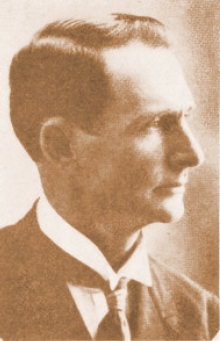 But, before going farther with the narrative, we had best give a bit
of attention to his education. And,. by his own admission, this was
limited. His mother taught school in her own home, and he had
learned how to spell almost every word in the old "Blue Back
Speller" before he was 5 years old - though he didn't know how to
recognize the words when he saw them in print. He said in his
autobiographical sketch "in my growing up years I was cut off from
school privileges; my only schooling being about fifteen months,
scattered along from time to time, from the time I was five until I
was about sixteen." But he also said, "My mother was a well educated
woman for her time, which gave me an advantage in home study. During
the whole of my youth, up to the time of my mother's death, when I
was nineteen, I spent my leisure time in study." Also the work he
did on the farm and ranch contributed to his learning. He became a
good bronco rider, an excellent hunter, and a good fisherman who was
able to keep the table provided with all the catfish the family
wanted. His study of photography broadened his intellectual field,
and his study of art gave him an aesthetic appreciation for the
beauty that lies all about us. And it must not be forgotten that he
had his Bible that he read and studied as a careful student. His
wife's sister had married Joe S. Warlick who attained considerable
fame as a gospel preacher with scholarly ability. Naturally, being
thus related, they were frequently together. In the memorial issue
of the Firm Foundation honoring J. W. Chism, Joe Warlick wrote, "I
suppose that I knew J. W. Chism better than any man among us. His
first wife and my first wife were sisters which fact brought us into
closer touch with each other than is usual among preachers. I knew
him well, long, and more or less intimately." Then a little later in
his article Brother Warlick said, "Brother Chism began his study of
Greek in my home. Fumbling around among the very few books in my
library he discovered Harkness' First Lessons in Greek; seeing the
book had a Greek alphabet in it, he laid down on my wife's home-spun
carpet, rolled far back under the bed, asking me as he disappeared,
not to tell anyone where he was, nor what he was doing. He spent the
whole afternoon there, and when he emerged from his hiding place, he
stated to me that he knew the Greek alphabet now; and that he could
spell some words in Greek. From that afternoon, he did not
discontinue his study of the language until he had mastered it far
enough to successfully handle it when in debate with men who tried
to use it to sustain themselves in fighting against the truth." Then
later on in the same article Brother Warlick said, "Brother Chism
took up the study of Bible Hebrew aided by an old Jew, a Hebrew
scholar, in the town near which Brother Chism lived at that time.
The scholar proposed to assist him, and this offer was gratefully
accepted. This study he kept up until he became a finished scholar
in Bible Hebrew."
But, before going farther with the narrative, we had best give a bit
of attention to his education. And,. by his own admission, this was
limited. His mother taught school in her own home, and he had
learned how to spell almost every word in the old "Blue Back
Speller" before he was 5 years old - though he didn't know how to
recognize the words when he saw them in print. He said in his
autobiographical sketch "in my growing up years I was cut off from
school privileges; my only schooling being about fifteen months,
scattered along from time to time, from the time I was five until I
was about sixteen." But he also said, "My mother was a well educated
woman for her time, which gave me an advantage in home study. During
the whole of my youth, up to the time of my mother's death, when I
was nineteen, I spent my leisure time in study." Also the work he
did on the farm and ranch contributed to his learning. He became a
good bronco rider, an excellent hunter, and a good fisherman who was
able to keep the table provided with all the catfish the family
wanted. His study of photography broadened his intellectual field,
and his study of art gave him an aesthetic appreciation for the
beauty that lies all about us. And it must not be forgotten that he
had his Bible that he read and studied as a careful student. His
wife's sister had married Joe S. Warlick who attained considerable
fame as a gospel preacher with scholarly ability. Naturally, being
thus related, they were frequently together. In the memorial issue
of the Firm Foundation honoring J. W. Chism, Joe Warlick wrote, "I
suppose that I knew J. W. Chism better than any man among us. His
first wife and my first wife were sisters which fact brought us into
closer touch with each other than is usual among preachers. I knew
him well, long, and more or less intimately." Then a little later in
his article Brother Warlick said, "Brother Chism began his study of
Greek in my home. Fumbling around among the very few books in my
library he discovered Harkness' First Lessons in Greek; seeing the
book had a Greek alphabet in it, he laid down on my wife's home-spun
carpet, rolled far back under the bed, asking me as he disappeared,
not to tell anyone where he was, nor what he was doing. He spent the
whole afternoon there, and when he emerged from his hiding place, he
stated to me that he knew the Greek alphabet now; and that he could
spell some words in Greek. From that afternoon, he did not
discontinue his study of the language until he had mastered it far
enough to successfully handle it when in debate with men who tried
to use it to sustain themselves in fighting against the truth." Then
later on in the same article Brother Warlick said, "Brother Chism
took up the study of Bible Hebrew aided by an old Jew, a Hebrew
scholar, in the town near which Brother Chism lived at that time.
The scholar proposed to assist him, and this offer was gratefully
accepted. This study he kept up until he became a finished scholar
in Bible Hebrew."
It may seem strange that this man should "crawl under a bed to study," but somehow or other he discovered that he could get away from people in this way. In his later years he frequently told people of this peculiarity of his. He would tell how he would get on the floor behind the bed and tell his wife if anyone came for him unless it was an emergency she could truthfully take a look and then say, "He was here a while ago, but I don't see him now." He was truly a scholar though it was not acquired in any accredited school of learning. He was an avid reader and he had a marvelous memory.
Brother Chism's first debate was with J. G. Webb. At this debate he arranged to hold three meetings in Collin County the next summer: at Blue Ridge, Fayeburg, and Bloomdale. In the Blue Ridge meeting the sectarian people became so incensed at him that they laid a trap for him, causing him to have to pay a fine of $25.00 for disturbing public worship. The fine, with costs, lawyer's fees, etc. amounted to $271.30. To clear his indebtedness he opened another photographic gallery; this time in Lewisville, Texas. This he opened in the fall of 1893, but the brethren continued to insist that he devote his full time to preaching and promised to support him. And with that promise he moved his family to Dublin, Texas where he lived for fifteen months, but the promise of adequate support failed and it was necessary to re-enter the business world. At this time he decided to try the insurance field, and it proved fairly profitable. He moved to Thorp Springs where he lived for a little more than four years. Then he took a contract covering Oklahoma, known as the Indian Territory so he moved his family to Norman, Oklahoma and as a representative for the Wisconsin Life Insurance Company. During his association with this company he preached as the opportunity was afforded, but he was compelled to stick to insurance to be assured a living for himself and his family.
While he was selling life insurance in Oklahoma his beloved wife, Fannie, took consumption and the doctors advised a move. They returned to Texas and located at Gorman where they stayed for a little over a year. At the insistence of his wife he quit the insurance business to devote his full time to the work of his Master. Fannie's health failed and finally, at 6:00 A. M. on August 21st of 1908 his beloved "brown eyes" passed from the trials of this world into that sweet rest that remains for the people of God. Fannie was buried in the peaceful cemetery at De Leon, Texas. This was a hard blow. His wife's death left him with six children, and his wife's last request had been that they should not be separated. At this time the oldest girl was not quite fifteen, and the baby boy was only three. For a while his sister's daughter took care of the children. Then, desiring a place the children could be placed in school he moved his family to Denton. There he arranged for a housekeeper, but shortly thereafter the second boy, Jack, began to be troubled with rheumatism and the housekeeper became fearful that he was taking consumption and so she quit. For a time he scattered the children as best he could among relatives and took Jack with him wherever he went, but the traveling didn't seem to agree with the lad and it soon became evident that some other arrangement had to be made.
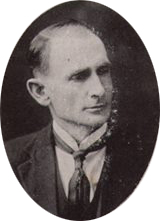 In the sad days following his wife's death J. W. had to keep busy to
provide the necessities of life for his family. His meetings carried
him into various sections of the state, and he was fortunate to meet
Miss Burts Kemper, of Angelina county, Texas. He had decided that he
would ask her to be his wife, but he didn't plan to do so too
quickly. However when the housekeeper quit, and when he discovered
that it was unwise to take Jack with him on his meetings he wrote to
Burts, telling her of his condition and asked her if she would be
willing to marry him and assume the responsibility of his family.
She agreed to do so - and that immediately. Thus on March 2, 1907 J.
W. Chism and Miss Burts Kemper were united in marriage by Brother T.
W. Phillips in the Christian Chapel at Homer. Thus Burts came home
to a big family to begin her married life. She proved to be quite
capable. Fannie's children came to love her dearly, and she proved
to be a wonderful wife as Fannie had been. The children obeyed the
gospel when they were quite young, and as they reached sufficient
maturity all became quite active in the work of the church.
In the sad days following his wife's death J. W. had to keep busy to
provide the necessities of life for his family. His meetings carried
him into various sections of the state, and he was fortunate to meet
Miss Burts Kemper, of Angelina county, Texas. He had decided that he
would ask her to be his wife, but he didn't plan to do so too
quickly. However when the housekeeper quit, and when he discovered
that it was unwise to take Jack with him on his meetings he wrote to
Burts, telling her of his condition and asked her if she would be
willing to marry him and assume the responsibility of his family.
She agreed to do so - and that immediately. Thus on March 2, 1907 J.
W. Chism and Miss Burts Kemper were united in marriage by Brother T.
W. Phillips in the Christian Chapel at Homer. Thus Burts came home
to a big family to begin her married life. She proved to be quite
capable. Fannie's children came to love her dearly, and she proved
to be a wonderful wife as Fannie had been. The children obeyed the
gospel when they were quite young, and as they reached sufficient
maturity all became quite active in the work of the church.
While J. W. was preaching in a meeting in Anson, Texas, Jack passed away on April 11, 1907, and he was buried beside his mother in the cemetery in De Leon, Texas.
J. W. had an inquiring mind. He wanted to know things, and he would not stop until he had learned them. He learned Greek and Hebrew and was well versed in history - both profane and ecclesiastical - and to acquire this knowledge on his own he invested a large portion of his income in books. He acquired a wonderful library, but this was destroyed by fire in 1917 that started in a neighbor's house and spread to theirs. He began replenishing his library, but many volumes in his first library were unavailable. He loved books and he spent many hours reading. Often he studied far into the night, but his studying paid off in the richness of his message and the readiness of his replies to opponents in debate. He had many debates. He lived in a debating age when men of varied faiths sought to maintain their convictions on the polemic platform. He was often called to represent churches in debates. In 1911 when Brother C. R. Nichol put out his Gospel Preachers Who Blazed the Trail he had this to say of J. W. Chism, "He has been preaching nineteen years and has baptized three thousand people into Christ—has engaged in more than a hundred debates, some of them lasting fourteen days. He has met almost every religious sect in the South, successfully. He has baptized two of his opponents in debate. He is now engaged exclusively in evangelistic work, which he expects to continue through life. He is one of the finest artists in the state, and while he does not work at it, he keeps up with all the latest methods in photography."
He began doing local work in 1916 in Hillsboro, Texas. From there he went to Texarkana, Texas and then to Ardmore, Oklahoma. His health broke two years before his death after a siege of influenza. He had been called to work in every state in the union save one, yet he often refused to go because he didn't want to be away from home. The bulk of his work was done in Texas, Oklahoma, Arkansas, and Louisiana. He was in the thickest of the fight against innovations. He was commonly called one of the "Old Guard" along with P. J. Taylor, H. F. Oliver, Joe S. Warlick, J. D. Tant, Early Arceneaux, W. W. Otey, C. R. Nichol and others who fought the battles of the Lord in the frontier. This list of warriors has been erased by the angel of death, but it will be impossible to erase the work they did.
J. W. Chism was the author of one series of lectures on Daniel. He also published a book on the Church and Its Membership, which was a review of a book by J. C. Weaver on Infant Baptism. Besides this he authored several tracts. And in addition to these a Doctor Tolison and a banker by the name of Ernst had his debate with John W. Ring, a Spiritualist, stenographically reported, and 2,000 volumes were published. This was out of print when Brother Chism died, but it was reprinted by the Old Paths Book Club. And, at the time of his death, J. W. had prepared an autobiographical sketch of his life and had most of the work done on a manuscript enlarging and revising his work on Daniel and another work against infidelity, and he was contemplating other writings at the time of his death.
Brother Chism died at his home, 416 Wheeler St., in Ardmore, Oklahoma on Saturday morning, February 16th, 1935 at 9:15. This ended a two year bout with ill health, but he was critical for only four days. Death came from pneumonia. He was survived by his wife, Mrs. J. W. (Burts) Chism; 2 sons: J. W. and H. B.; four daughters: Mrs. Peggy McCann, Miss Nell Chism, Mrs. R. P. Reagan, Mrs. Harry Arnold and a foster daughter, Miss Viola Lanning. He was also survived by three brothers: Marshall Chism, Dr. Matt Chism, and O. J. Chism. Thus ended the story of a great man of God. And yet the influence of his life lives on.
—Gospel Preachers Of Yesteryear, Loyd L. Smith, pages 100-107, This Article Originally Appeared In The Christian Worker, written by Flavil Yeakley, May 1978
![]()
Getting Acquainted With Our Preaching Brethren: J.W. Chism
The parents of J.W. Chism came from Mississippi to Texas in an early day, and settled in Comanche Co., then Mercer’s colony, which at that time was the extreme frontier of Texas. They were both Christians, as were their families before them. His father, Jehu M. Chism, served nine years in Texas frontier service. His mother was the daughter of Dr. Mac Hackworth, one of the pioneers of the reformation in Alabama, Mississippi and Tennessee. Like Timothy, he has two generations of faithful servant of God behind him.
J.W. (Jehu Willborn) Chism was born the last year of their stay in Comanche Co., on April 1, 1865. He was baptized under the preaching of Ed Stirman, at Crystal Falls, Texas, when in his fifteenth year. He had read the New Testament through when a boy of thirteen, and began a careful study of the New Testament. He read the Revised Version the year it came out, and has since continued to search the scriptures.
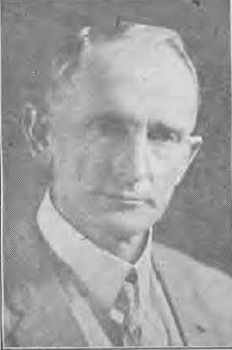 On May 4, 1890, he was married to Miss Fanny Campbell,
daughter of G.M. Campbell of Joshua, Texas. To this union were born
six children, three girls and three boys (Four of whom are still
living, three girls and one boy, on boy having died when nine, and
the oldest, Matt Hugh being killed on the battlefields of France,
Nov. 1, 1918.
On May 4, 1890, he was married to Miss Fanny Campbell,
daughter of G.M. Campbell of Joshua, Texas. To this union were born
six children, three girls and three boys (Four of whom are still
living, three girls and one boy, on boy having died when nine, and
the oldest, Matt Hugh being killed on the battlefields of France,
Nov. 1, 1918.
J.W. Chism began preaching the fourth Sunday in April, 1891, at the urgent demand of the elders at Joshua, of whom G.M. Campbell was one. Fanny proved to be a companion indeed, and a helper in his work as a minister. She was always willing to make the necessary sacrifices that he might devote his whole time to preaching.
During the first year of his ministry, he preached twenty-seven times, and in the beginning of his second year he conducted his first religious debate. This was followed by a second in November of the same year, and a third in February of the next year.
June, the third Sunday, 1892, he began his first protracted meeting. He preached eleven sermons, all he could then preach, and baptized ten, all of whom were grown people. From that time his work as a preacher began to call him for other work, and by 1893 he was kept busy all the time. For years following, he could fill scarcely a tenth part of the calls he has for meetings.
Fanny died in 1906, leaving him with six children, the oldest, a girl not quite fifteen, and a baby boy of three. This was the hardest blow of his life.
The next year he was married to Miss Burts Kemper, of Lufkin, Texas; who prove to be all that he could hope for as a mother to his children and as a helper in his work as a minister. She, too, was willing to make all sacrifices needful, working with her own hands, to care for and direct the children In his absence so that he might continue to preach. To this union two children were born, a girl and a boy. All of his children obeyed the gospel when young.
Soon after he began preaching, he took up the study of Greek, and a few years later, the study of Hebrew. Both of these studies he has always kept up. This has been a great aid to him in his critical Bible study. He has devoted many years not only to a study of these two languages, but to history as well, both profane and ecclesiastical. He at one time had accumulated a wonderful library, more than a hundred volumes of history, with many other rare books. But fire, in 1917, starting next door to him, swept them all away. This was a heavy loss, as most of the histories had been carefully read and indexed. Two o’clock in the morning often found him still at his studies. But he has accumulated another good library.
He evangelized summer and winter until 1916, when he began local work at Hillsboro, Texas. During the years spent on the field, and also since, he had many more calls for work that he could reach, so that he has always turned much work to other preachers, supplying several preachers each year with almost full-time work.
He has been called by the churches to represent them in more than two hundred debates. (Fire having destroyed his recorded, he only numbered those that he could call to memory). These lasted for four days to fourteen days, the great majority of them being six days or longer. The time put in debating, counting four hours, two services the day, would run a bit over seven years and six months straight time, counting Sundays as well as weekdays. Twice he has baptized his opponent, and has often baptized many others as well at close of debates.
Since 1916 he has done local work most of the time, beginning at Hillsboro, where he resigned the local work, he remained one of the bishops until he moved away. Sometime ago, he resigned the work at Ardmore, and has since been giving his time to protracted meetings. He has no definite record of the number baptized under his ministry, but they run into the thousands (possibly ten thousand or more).
Though his health broke tow years ago, with a long siege of influenza, which life his throat in bad condition, at present he is home recuperating. His doctor says that he should yet be able to do many years of good work in the Master’s vineyard.
For the past twenty-five years he has helped more solve the hard problems of the Bible, and he has always delighted in helping the young preachers who have appealed to him for assistance. During his whole ministry, he has steadfastly opposed innovations, and has never swerved from the New Testament position. He has received calls from every state in the union, save one. However, he has refused some of the distant calls, for he has felt that he could do just as effective work without going too far from his home base. His principal work has been in Texas, Oklahoma, Arkansas, and Louisiana, but he has occasionally labored in Colorado, New Mexico, and Kansas.
Brother Chism was an associate editor for the Firm Foundation for many years. He has had published one serried of lectures on Daniel. (This work has been revised and greatly enlarged, and is now ready for the printer..) He has written several other books: “The Church and Its Membership,” “Debated with Jon W. Ring, Spiritualist,” and sever al tracts. Al these publications are now out of print (The debate with Mr. Ring was published by Dr. Tolison and Mr. Ernst.) Brother Chism has also prepared the manuscript for a book against infidelity in its modern form, and is contemplating other writings.
An active preacher and a diligent student. Brother Chism is universally recognized as one of the best thinkers in the brotherhood.
—J.H. Childress, Firm Foundation, Vol. 51, No. 46; Tuesday, November 13, 1934 page 2
![]()
Firm Foundation Memorial Issue
Jehu Wlllborn Chism was born In Comanche county, Texas, April 1, 1865. His parents, Jehu M. and Sallie (Hackworth) Chism, were both Christians. Brother Chism was baptized under tihe preaching or Ed Stlrman, at Crystal Falls, Texas, at the age or fifteen.
On May 4, 1890, he was married to Miss Fanny Campbell. To this union six chlldren were born, two of whom have deceased —Jack Norvel Chism, and Matt Hugh Chism. The latter fell in the World War. His good wire died in 1906 leaving six children. He was then married to Miss Burta Kemper, and to this union two children were born.
Brother Chism begun preaching in 1891, and has been very active in the Master's cause, being engaged for the most part in evangelistic work. For nearly 45 years he labored for the Lord.
Those who survive are: his wife, Mrs. J. W. Chism; his children. Mrs. R. P. Reagan, Burkburnett, Texas: Mrs. Peggie McCann, New Orleans, Louisiana; Miss Nell Chism, Pecos, Texas; H. Bemer Chism, Ardmore. These children were by his first wife. Mrs. H. C. Arnold, Ardmore; and J. W. Chism. Jr. of New Orleans, Louisiana; also one foster-daughter, Miss Viola Lanning o! Dallas, Texas; one living grandson, Alan Arnold; three brothers, Marshall, Chism, Fort Cobb; Dr. Matt Chism, Graham, Texas, and O. J. Chism, Krum, Texas.
Brother Chism departed this life February 16, 1935, 9:45A. M. at the age of 69 years, 10 Months, and 16 days.
-Firm Foundation, March 26, 1935, p.1
![]()
J.W. Chism, The Man, The Scholar
Relatives and other close friends insist that I say a few words more than the above brief obituary contains, which was read by Brother C. R. Nichol at the funeral of J. W. Chism, and ask that the same be published along with the items stated above.
I suppose that I knew J.W. Chism better than any other man among us. His first wife and my first were were sisters, which fact brought us into closer touch with each other than is usual among preachers. I knew him well, long, and more or less intimately. I know he was upright in his ways, clean in his life and loyal to the cause of his Master. Brother Chism kept the faith, fought a good fight, and I am sure his friends will all say that he finished the course of the Christian's life's meanderings as fully as did any man of his day. He was tried almost by fire in many ways; he lost his home by fire twice, losing his library each time, at least in the most part: but he rallied and came again to make himself able to tight the fight of faith from every point of view, meeting the opposers of the Christ and his cause in open battle, from the blatant infidel up to every form of sectarian teaching: meeting some of the strongest men among the denominations. He was unflinching, never did he one time falter, nor shirk duty's call when it came to him.
Brother Chism began the study of Greek in my home. Fumbling around among the very few books in my library, which was very small at that time, he discovered "Harkness' First Lessons in Greek;" seeing the book had the Greek alphabet in it, he laid down on my wife's homespun carpet, rolled far back under the bed, asking me as he disappeared, not to tell anyone where he was, nor what he was doing. He spent the whole afternoon there, and when he emerged from his hiding place, be stated to me that he knew the Greek alphabet now; and that he could spell some words in Greek. From that afternoon, he did not discontinue his study of the language until he bad mastered it far enough to successfully handle it when in debate with men who tried to use it to sustain themselves in fighting against the truth.
After some years Brother Chism met D. A. Leak, a Christian preacher, representing the cause of the digressive brethren, in a debate on "Instrumental Music in the worship." In this, their first debate, they dealt somewhat with the Greek of the New Testament, and in that debate Brother Chism was success!ul.
After that first debate Brother Chism took up the study of Bible Hebrew aided by an old Jew, a Hebrew scholar, in the town near which Brother Chism lived at that time. The scholar proposed to assist him, and this offer he gratefully accepted. This study he kept up until he became a finished scholar in Bible Hebrew. It was after this schooling in the Hebrew that he was called to debate with D. A. Leak again over at Center Ridge, Arkansas. In the second debate, Brother Leak served notice on Brother Chism that while in the former debate, they studied only in the Greek and English, that this time they were going back into the old language of the Old Testament, the Hebrew, "but," said Look, "I may not get to this in my first speech," (Leak opened the debate), "but we shall give most of our time to the Hebrew now." When Chism arose to reply, he took some chalk, walked to the blackboard, and wrote some three or more words in Hebrew on the board, and said: "Now Brother Leak, on which of these words do you base the debate? I read the Hebrew like I read English, and I'm as well prepared for you in that language as I would be in any other." Well, Brother Chism was not able to get Brother Leak to even hint a desire to delve into the Hebrew throughout the whole of the debate. The truth was, Leak could not read what Chism had written on the board, for he knew nothing about the language, except what he had seen from a few other incompetent scholars who were no more than mere pretenders such as he was.
I could relate many such stories, showing what Brother Chism did as a student, some of which I told in the talk I made at the funeral, but space forbids my doing so here. I will say any way, that if some of our young preachers could know just how a man without learning to begin with, made of himself such a scholar as few have become, it would be greatly to their credit, after they had profited by the lesson, provided they were exercised by the example.
In the home and with his family, Brother Chism was a splendid executive. He was firm but kind with his children, and able always to advise correctly. He was gentle when correcting and kindly spirited when controlling them. To his wives he was always mild, loving, forbearing, and they were fully appreciative or his counsel. Sister Chism remarked on the clay of the funeral, when trying to express how she felt over his passing, "When we would go to him for advice, he always told us the right things to do. What on earth will we do now, when standing in the need of him?" I know she was correct, and I know now how much she will miss him.
Brother Chism's faith in the Bible was as deeply grounded as any man I ever knew; his life as a Christian was very devoted to an ideal he was fully able to discern, and closely did he hold himself to the goal, after which he sought with a determination, not easily equaled.
He is gone from us now. His voice is still. His trenchant pen is forever silent. We shall see him no more in this life. But he will be standing as near the gate as he may be permitted to approach, waiting for us to welcome us in, when we reach the sublime summit over which he has already climbed. May God help us all to be patient while we wait.
-Joe S. Warlick, Firm Foundation, March 26, 1935, p.1
![]()
No Abler Preacher And Debater
I was recently called by telegram to Ardmore, Oklahoma, to be present at the burial of J. W. Chlsm.
To my mind there was no abler preacher and debater than Brother Chism. He and I had been fighting on the firing line as coworkers for forty-five years. I, like David of old, feel weak today without him. Joe Warlick, C. R. Nichol, and myself tried to talk at his burial. There were thirty to forty leading preachers from all over North Texas and Oklahoma at his burial, besides many others who came to weep with his family.
P.J. Taylor, Joe S. Warlick, H. F. Oliver, J.W. Chism, and I were about all the "old guard" that was left. Chism has gone and soon the call will come to me. C. R. Nichol and R. L. Whiteside were there. Foy Wallace Sr. desired to be there but his health did not permit. Many call them old men, but we look upon them as belonging to the younger set of gospel preachers, as we were on the battlefield when they came into action.
Chism lived, made many sacrifices, fought the battle of life, led thousands to Christ. Be reared a large family of children, all of whom are devoted members of the church of Christ. Now he has laid down the cross and gone to receive his crown. Befog human be made mistakes like we all do. He was condemned by some and loved by many.
I was glad to be at his burial. My heart with prayer goes out for his heart-broken family. I have no doubt It Is better with him and I shall meet him soon.
-J.D. Tant, Firm Foundation, March 26, 1935, p.1
![]()
In Every Sense A Christian
The news has just reached me that Brother J.W. Chism has been called home. It bas been my pleasure to be associated with Brother Chism at several places in gospel work. I was a guest In his good home several times and a better home was never enjoyed. His family was well ordered and courteous and knew as but few do, how to make a guest feel perfectly welcome. Brother Chism was a student, a gentleman, and an outstanding preacher of unusual ability and in every sense a Christian. The influence of such men will be bearing fruit when the Lord comes. We sincerely pray the blessing of our Father upon his good wife and children as they weep for a loved one gone before, but not as those who have no hope.
-Horace Busby, Firm Foundation, March 26, 1935, p.1
![]()
No Equals No—No Superiors
l probably owe more to J. W. Chism, in reaching a proper division and understanding of the word or truth than to all other men. Twenty-five or thirty years ago, Brother Chism made my home his home !or several revival meetings. and during such times he preached monthly In my home town in East Texas.
Brother Chism was a student not only of the Bible but of everything. He was indeed a self-made man. In order to obtain knowledge, he suffered many hardships. As Confucius said: "The scholar who cherishes the love of comfort is not fit to be deemed a scholar."
Brother Chism early learned the importance of making clear and concrete statements so that his thoughts could be understood. He used no Delphic language. As an example of the concrete and definite statements and manner of expression used by Brother Chism, some twenty-five or thirty years ago, I asked him to give me In writing the fundamental conditions of an acceptable prayer. He gave me the following:
(1) "Harmony between the man offering the prayer and Jehovah.
(2) "Never pray for anything that you cannot be and are not willing to be instrumental and cooperative in the bringing about of the answer to such prayer."
The above principles have remained indelibly impressed upon my mind since, and I believe they are correct conditions.
Whether in debate or in the pulpit, no one who knew Brother Chism ever anticipated a failure. If he was above other men, it was because or his knowledge; and, in the language of Addison, "Knowledge is, indeed, that which, next to virtue, truly and essentially raises one man above another."
As a Bible teacher and a debater, Brother Chism had but few equals and no superiors. "And I beard a voice from heaven saying unto me, Write, Blessed are the dead which die In the Lord from henceforth: Yea saith the Spirit, that they may rest from their labors; and their works do follow them."
-R.O. Kenley, Firm Foundation, March 26, 1935, p.1
![]()
My Personal Friend
I have just read In the Firm Foundation of the passing away of Brother J.W. Chism on February 16.
It was my privilege and special pleasure to know and to be personally associated with Brother J. W. Chism in the Lord's work in Texas and Oklahoma many years ago. We were first associated together at Graham, Texas, when we were both young men before he became known as a preacher, and about five years after I began trying to preach. While I have not been with Brother Chism in person for several years, I have been with him in spirit, prayer, and Christian fellowship. I am still thanking God for giving to the church of Christ, and through it to the world, J. W. Chism with his strong, logical mind, his fervent love of truth and righteousness, his natal and acquired ability to present the truth of the gospel forcefully with telling effect.
I reel that I have lost a personal friend. The church has lost an able minister, and the world a most worthy and useful citizen. His family has lost its honorable and efficient head.
No, in reality we have not lost him, for he still lives with us through his good works which will continue to follow him till time shall he no more, whlle he sweetly rests in eternal peace (Rev. 14:13). I join with others In saying that a great man has fallen.
-J.J. Wyatt, Firm Foundation, March 26, 1935, p.1
![]()
In Memory Of J.W. Chism
The Covered Bridge
Tell the fainting soul in the weary form,
There's a world of the purest bliss,
That Is linked, as the soul and form are linked,
By a Covered Bridge, with this.
Yet to reach that realm on the other shore
We must pass through a transient gloom.
And must walk, unseen, unhelped, and alone.
Through that Covered Bridge the tomb.
But we all pass over on equal terms,
For the universal toll
Is the outer garb, which the hand of God
Has flung around the soul.
Though the eye is dim, and the bridge is dark,
And the river its spans is wide,
Yet faith points through a shining mount.
That looms on the other side.
To enable our feet in the next day's march
To climb up that golden ridge,
We must all lie down for one night's rest,
Inside of the Covered Bridge.
Sleep on, dear brother, and take thy rest
Till Christ shall call for thee;
When thou shalt rise with all the blest.
Forever with Christ to be.
- Wanda Stone,
3526 Indiana Street.
San Diego, California.
-Firm Foundation, March 26, 1935, page 3
![]()
Directions To The Grave Of Jehu W. Chism
Jehu Willborn Chism is buried in the Rose Hill Cemetery In Ardmore, Oklahoma. Ardmore lies about 100 miles south of Oklahoma City. Take I-35 to exit 31B. Travel East on Hwy. 70 into the city. Take a right on South Commerce Street (Hwy. 77). Turn left on Drew St. Cross RR Tracks. After the RR Track the road will merge with Lake Murray Dr. E (Hwy.77S). After the merge take the next road to the right, Douglas Blvd, (or it might be called C St. SE.) Head south about 10 blocks and you will run into the Rose Hill Cemetery. Continue into the cemetery to the south side, about 13 sections until you get to 15th street and turn right(west) and head about four sections. Grave is in the sw corner of section 169. The grave is on the SW corner of the section.
GPS Coordinates
Acc. to 16ft.
N34° 08.632’ x WO97°08.200’
or D.d. 34.143889,-97.136639
Section 169 - E Of H-13,14 (Cnr. Of Section)
View Larger Map
![]()
>Photos Taken In 2004
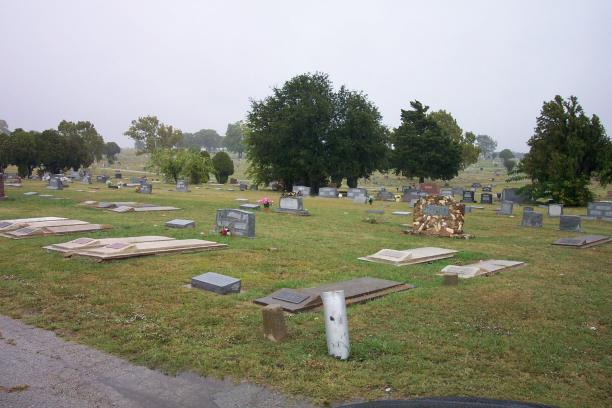
Looking NE From Cnr. Section 169,
Chism's Monument Is The First In The Foreground
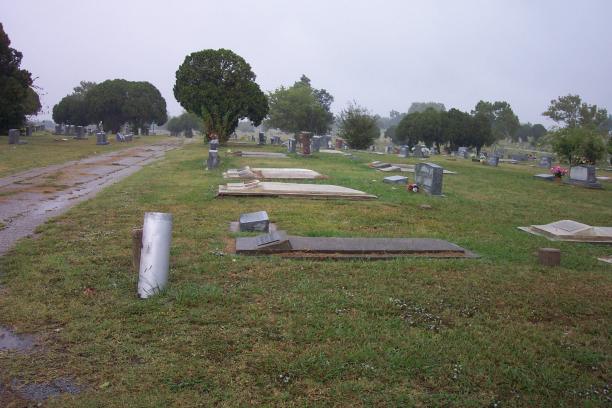
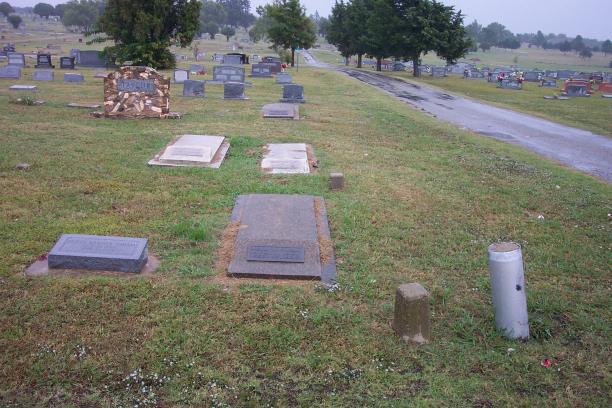
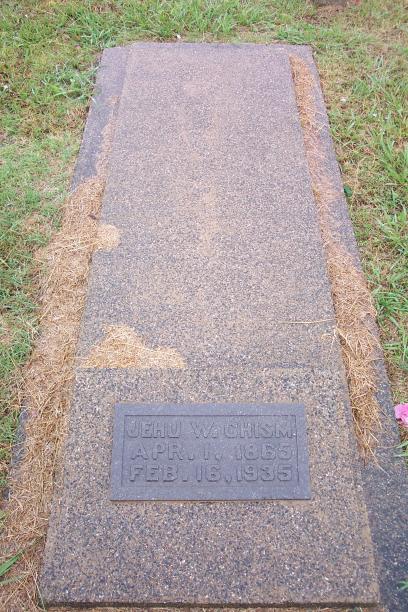
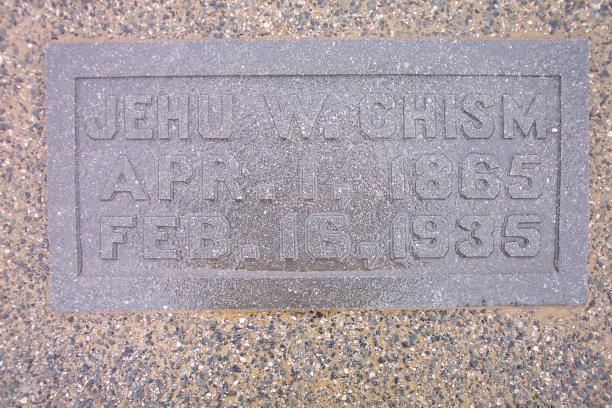
New Photos In February, 2012
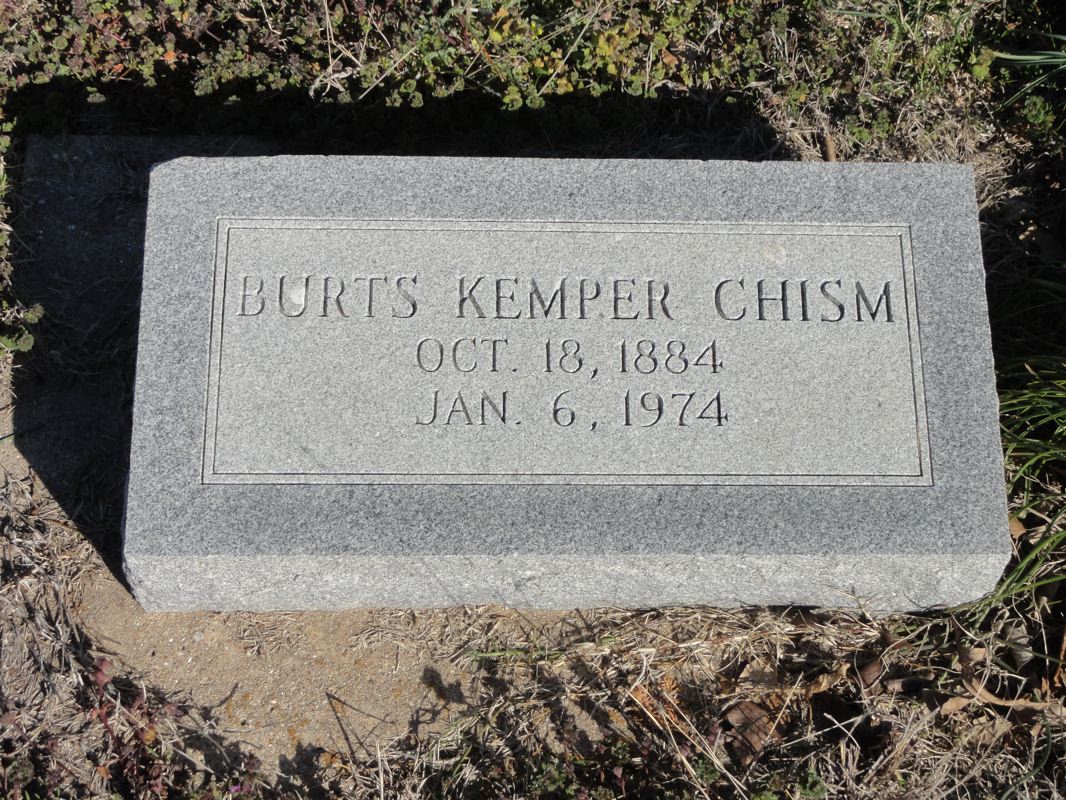
Burts Kemper Chism
October 18, 1884
January 6, 1974
![]()
Photos Taken October, 2004 & February 23, 2012
Courtesy of Scott Harp
www.TheRestorationMovement.com
Web editor note: In October, 2004 I visited the grave of J.W. Chism for the first time. I was travelling with my good friend and Scottish preacher, Graham McDonald. It was a wet Sunday afternoon when we finally arrived at the cemetery. We found the grave, and were pleased to get shots. Once again in February, 2012, it was my privilege to visit the grave of J.W. Chism. I was invited to take part in the annual Affirming The Faith Lectureship in Oklahoma City, Oklahoma. Getting into the area early, I was afforded the opportunity to put about 2000 miles on a rental car in order to locate graves of gospel preachers and church leaders of yesteryear in a wide area. My fourth day I was able to visit the grave of J.W. Chism.
![]()
